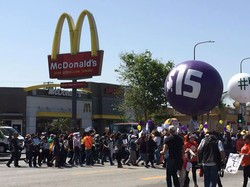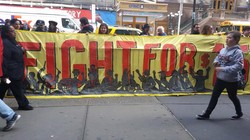An effort to raise the minimum wage for fast-food workers in New York City to $15 an hour is getting high marks from Presbyterian Church (U.S.A.) leaders. A panel appointed by Governor Andrew M. Cuomo made the recommendation last week. New York’s acting commissioner of labor is expected to move forward with the recommendation. Church officials say this has been a long time coming.
“This is one of the most energized and successful things happening in the country in regard to labor,” said Ruth Farrell, coordinator for the Presbyterian Hunger Program (PHP). “Cities like Seattle, San Francisco and Los Angeles are not waiting for Congress, which has raised the minimum wage only three times in the last 30 years, but are moving ahead. By doing so, city officials show that increasing the minimum wage stimulates and strengthens the local economy as well as reduces the need for full-time workers to rely on government assistance such as food stamps to make ends meet.”
“Presbyterians are involved in a number of the campaigns. Through One Great Hour of Sharing, they support these organizations and many others that are working on economic justice, living wage struggles, wage theft recovery and rights in the workplace,” said Andrew Kang Bartlett, PHP associate. “The PC(USA) has been supportive of Interfaith Workers Justice, Restaurant Opportunities Centers United and Food Chain Workers Alliance. All three organizations have been very active in campaigns to improve wages.”
PHP advocates and other organizations have argued that fast-food chains were not doing enough to help their workers avoid having to rely on government assistance such as food stamps. The $15 wage would represent a pay hike of more than 70 percent for workers currently earning $8.75 an hour.
“We believe this is only the beginning and hope it has a domino effect on employees in other industries across the state of New York and the nation,” said Kang Bartlett. “Hopefully, government leaders are beginning to understand that, in many cases, fast-food workers are the major wage earners for their families and they need all the help they can get to put food on the table.”
Under the panel’s recommendation, the city’s minimum wage would increase gradually over the next few years until it reaches $15 at the end of 2018. In the rest of the state, hourly wages would rise each year, reaching $15 an hour in 2021. The rate would apply to all workers in fast-food restaurants that are part of chains with at least 30 outlets.

Fast-food workers protest in both Los Angeles and New York City to raise wages to $15 an hour. —Courtesy of Food Chain Workers Alliance
“There is something wrong when full-time, year-round workers qualify for government assistance while the businesses that employ them are posting millions and even billions in net profits. It is especially poignant when food workers are unable to put food on their own tables or daycare workers are unable to care for their own children,” said Farrell. “It reminds me of the verses in Isaiah 65 that offer what may have been an outlandish image: construction workers not being able to afford homes, and farm and food workers not being able to afford food. And yet that is descriptive of today’s reality in our economy. We can change this so that workers will not labor in vain but will be able to afford food, shelter and healthcare.”
A federal bill, the Raise the Wage Act, was introduced in April. It would ensure that all workers are paid a minimum wage of $12 an hour and phase out a two-tiered wage system. The current federal tipped minimum wage is $2.13 and has been frozen at that rate for 25 years.
“In a time when jobs reports indicate that unemployment is going down while poverty rates are increasing, it is good that New York, a thoroughfare of commerce, is taking increasing wages seriously,” said Rev. J. Herbert Nelson, director of the PC(USA) Office of Public Witness. “The nation must follow this lead to keep people who work every day out of poverty.”

